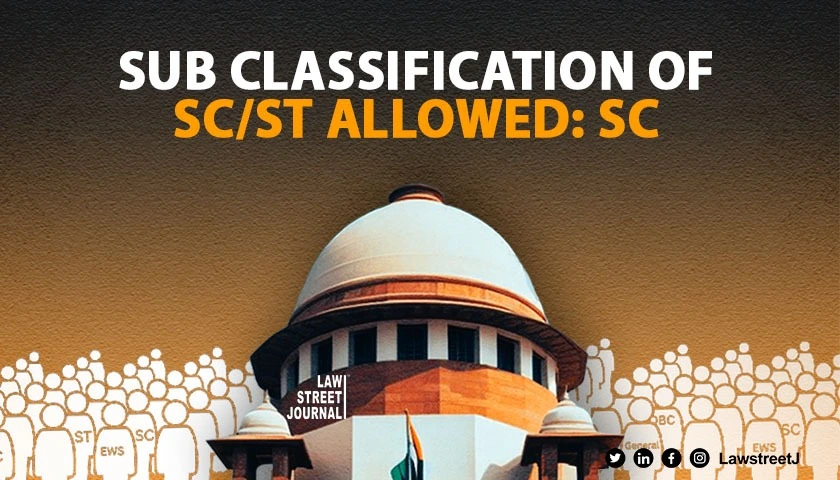NEW DELHI: In a major judgement, set to trigger political murmurings the Supreme Court on Thursday ruled that sub classification of Scheduled Castes and Scheduled Tribes is permissible to provide preferential treatment to the disadvantaged groups within them.
The judgement would pave the way for the States to carve out creamy layers among the SC/STs to exclude them from the benefit of reservation in jobs and education.
By a majority view of 6:1, a seven-judge bench headed by Chief Justice of India D Y Chandrachud overruled the 2004 judgment of a five-judge Constitution bench in case of E V Chinnaiah vs State of Andhra Pradesh, which had held SC/STs were homogeneous group.
In the bench, Justice Bela M Trivedi dissented with the majority view.
As many as six separate opinions rendered in the case.
In his judgment, the CJI said historical and empirical evidence indicated that the Scheduled Castes are not a homogenous class.
Sub classification within SCs does not violate Article 14 of the Constitution, he said.
Justice B R Gavai said it is duty of state to give preferential treatment to the backward communities, as only few people within the category of SC/ST are enjoying the reservations.
He said treating children of those SCs belonging to creamy lawyers similarly to children of a manual scavenger in a village would be unfair.
The majority also emphasised on carrying out the exercise of collecting empirical data on inadequacy of representation to make any classification within SC/STs.
Justice Vikram Nath, in his judgment, stressed on the need for applying creamy layer principle which was applicable to the OBCs to the SC/STs as well.
In her lone dissenting judgment, Justice Trivedi said sub-classification by states would amount to tinkering with the Presidential notification under Article 341(2) of the Constitution.
She held that the provisions under Articles 14, 15, 16 of the Constitution are merely enabling provisions and cannot give the power to States to sub-classify the SC/STs.
Justice Pankaj Mithal, also agreeing to the majority view, held that the benefit of reservation ought not to be available to the next generation.
Justice Satish Chandra Sharma also said identifying creamy layer among SC/STs should be imperative for the States.
On February 8, the court had reserved its judgement on sub categorisation in SC/STs for providing quota, after hearing submission from the Centre, states and others, on references to revisit a 2004 judgment of a five-judge Constitution bench in the case of EV Chinnaiah vs State of Andhra Pradesh.
The 2004 judgment had held that the SCs and STs are homogenous groups and hence, States cannot further sub-classify them to grant a quota within a quota for the more deprived and weaker castes in these groups.
The Punjab government and others filed a plea in SC against a 2010 verdict of the Punjab and Haryana High Court, which had struck down section 4(5) of the Punjab Scheduled Castes and Backward Classes (Reservation in Services) Act, 2006 that provided a 50 % quota and the first preference to the “Valmiki” and “Mazhabi Sikh” castes in public jobs within the SC quota.
On August 27, 2020, a five-judge bench differed with the Chinnaiah judgment and referred it for adjudication by a larger bench of seven judges or more for an authoritative pronouncement.

















